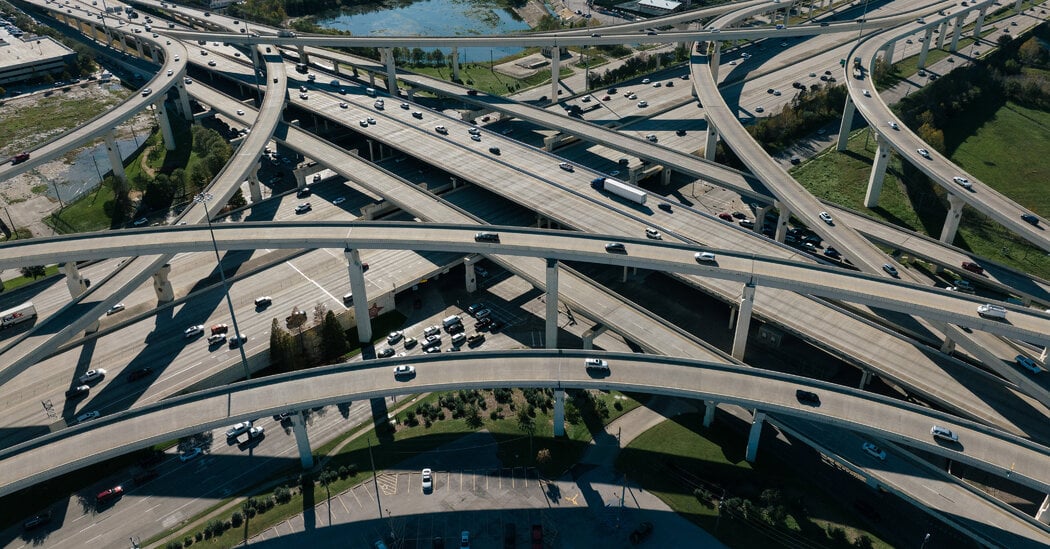- cross-posted to:
- fuckcars@lemmy.world
- cross-posted to:
- fuckcars@lemmy.world
For critics of widening projects, the prime example of induced demand is the Katy Freeway in Houston, one of the widest highways in the world with 26 lanes.
Immediately after Katy’s last expansion, in 2008, the project was hailed as a success. But within five years, peak hour travel times on the freeway were longer than before the expansion.
Matt Turner, an economics professor at Brown University and co-author of the 2009 study on congestion, said adding lanes is a fine solution if the goal is to get more cars on the road. But most highway expansion projects, including those in progress in Texas, cite reducing traffic as a primary goal.
“If you keep adding lanes because you want to reduce traffic congestion, you have to be really determined not to learn from history,” Dr. Turner said.



This is because the extra lane allows demand to change. It is not congested so people feel ok building and moving to further out suburbs. This continues until demand has increased to cause delays.
Note that Houston and Paris have about the same population. Paris is 1/3 the size. They are actually removing a lane from their loop highway and planting trees, and turning another lane into busses only. Only considering transportation, I would much rather live in Paris.
If you also consider the weather and politics, I would still much rather live in Paris.
Food and culture, also Paris
Houston has fantastic food. I will die on that hill.
I’ll die on that hill with you. Most likely from self-induced health problems from loving the good food here too much, but for all the crap that we deal with the good food is a plus.
I know I’m putting myself in harm’s way, but I would say Austin instead. Houston is a large parking lot with buildings in-between.
Austin is not a better food city. It might be a better city, but not because of the food.
I was just being facetious; I spent quite some time in Plano and around Dallas and I don’t miss it due the whole commuting thing.
I had to drive to Houston now and then it was a miserable experience, and made me bitter of the whole Americana road trip thing.
That said, on last trip, we went somewhere down to Sant Jacinto (?) and I’ll gladly live there. I did had some delicious crawfish that later vomited somewhere along the I-10 East freeway.
Edit: maybe I’m just mad nobody wears ten gallon hats.
Let’s list the reasons why Houston is better…hrmmm…I got nothing.
Less French people?
Plenty of Cajuns in the area, which is basically French-Swamp-People
We prefer swamp frenchies.
Source, am half swamp frenchie
French bad. Wow, never heard that one before.
But what options do you have in Houston, compared to Paris?
You can’t just not widen roads but instead
— less sprawl - places to live closer to each other and to destinations
– useful transit or short distance commute options
– remove bottlenecks
These are a lot harder to do, and I don’t imagine Houston even considered it
Investing is public transport can be as hard or as easy as you want it to be. Sure building a full on subterranean high density metro system might be the utopia, but actually developing a high frequency, high quality bus route with dedicated bus lanes can be low cost and hugely increase the volume of people carried Vs the lane you took from cars.
Compliment this with docking cycle rental schemes, and some dedicated cycle infrastructure and you can transform how a big chunk of people get to work …you start to win back the city from one which is built around cars and instead making it a city for people.
In Texas, and most of the places I know of, people won’t ride the bus, or the bike. When it’s August and the high temp for the day is 108, with 65% relative humidity, everybody wants to get in their car with the AC blowing directly on them, and be comfortable.
In my experience, every public bus I’ve been on has been miserable.
Paris also has a subway.
A modern bus on a hot day is like walking into a fridge in my country. They also look about 30 years newer than whatever I’ve seen when it comes to American buses, so that might help a little.
I stayed in Paris for a few months once, never once used a car. Never once had a problem getting somewhere, either.
This makes sense. With the increased cost of city living, and an ever increasing population; doesnt this support the need for more lanes?